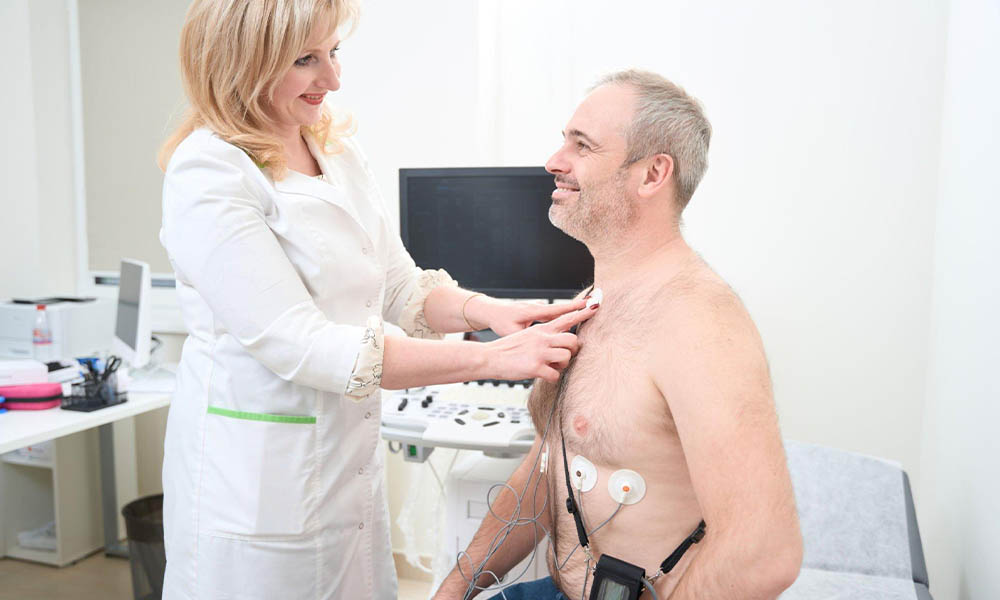It’s essential to raise awareness about health issues, especially those that can be potentially life-threatening. One such problem is heart arrhythmia. Heart arrhythmia is a condition in which the heartbeat becomes irregular or abnormal. In this article, I will discuss what heart arrhythmia is, its types, causes, symptoms, diagnosis, and treatment options.
Table of Contents
ToggleIntroduction to Heart Arrhythmia
Heart arrhythmia is a condition in which the heart beats irregularly, too fast, or too slow. The heartbeat is controlled by electrical impulses that originate in the sinoatrial (SA) node, located in the right atrium. These impulses travel through the heart and cause it to contract and pump blood to the rest of the body. In a healthy heart, the rhythm of these electrical impulses is regular and consistent. However, in a heart affected by arrhythmia, the electrical impulses are abnormal, causing the heart to beat irregularly.
There are different types of heart arrhythmia, each with its own set of symptoms and treatment options. Some types of arrhythmia are harmless and do not require treatment, while others can be life-threatening. It’s essential to understand the different types of heart arrhythmia to identify the symptoms and receive timely medical attention.
Types of Heart Arrhythmia
There are different types of heart arrhythmia, including:
- Atrial Fibrillation (AF): AF is a type of arrhythmia in which the heart’s upper chambers (atria) beat irregularly and out of sync with the lower chambers (ventricles). This can cause the heart to pump less efficiently, leading to symptoms such as fatigue, shortness of breath, and chest pain.
- Atrial Flutter: Atrial flutter is similar to AF, but the heart beats faster and more regularly. This can also lead to symptoms such as dizziness, fatigue, and shortness of breath.
- Supraventricular Tachycardia (SVT): SVT is a type of arrhythmia in which the heart beats too fast (more than 100 beats per minute). This can cause symptoms such as palpitations, chest pain, and shortness of breath.
- Ventricular Tachycardia (VT): VT is a type of arrhythmia in which the heart’s lower chambers (ventricles) beat too fast (more than 100 beats per minute). This can be life-threatening and requires immediate medical attention.
- Ventricular Fibrillation (VF): VF is a type of arrhythmia in which the ventricles quiver instead of contracting, leading to a lack of blood flow to the body. This is a medical emergency and requires immediate treatment.
Common Causes of Heart Arrhythmia

Heart arrhythmia can be caused by various factors, including:
- Heart Disease: Heart disease, such as coronary artery disease, heart valve disease, or heart failure, can cause arrhythmia.
- Electrolyte Imbalance: An imbalance in the body’s electrolytes, such as potassium or magnesium, can affect the heart’s electrical impulses and lead to arrhythmia.
- Stress: Emotional or physical stress can cause the heart to beat irregularly.
- Drug or Alcohol Abuse: Alcohol, caffeine, nicotine, and some medications can cause arrhythmia.
- Genetic Factors: Some types of arrhythmia can be inherited.
It’s essential to identify the underlying cause of arrhythmia to determine the appropriate treatment.
Symptoms of Heart Arrhythmia
The symptoms of heart arrhythmia can vary depending on the type of arrhythmia and the severity of the condition. Some common symptoms include:
- Palpitations: A sensation of skipped or extra heartbeats.
- Fatigue: Feeling tired or exhausted.
- Dizziness: Feeling lightheaded or faint.
- Shortness of Breath: Difficulty breathing, especially during physical activity.
- Chest Pain: A discomfort or pressure in the chest.
- Sweating: Unusual sweating, especially during a sudden episode of arrhythmia.
If you experience any of these symptoms, it’s essential to seek medical attention to identify the underlying cause and receive appropriate treatment.
Diagnosing Heart Arrhythmia
To diagnose heart arrhythmia, your doctor may perform several tests, including:
- Electrocardiogram (ECG): An ECG records the electrical activity of your heart and can detect abnormal rhythms.
- Holter Monitor: A Holter monitor is a portable ECG that records your heart’s electrical activity for 24 to 48 hours.
- Event Recorder: An event recorder is a portable device that records your heart’s electrical activity for a more extended period (up to 30 days).
- Echocardiogram: An echocardiogram uses ultrasound waves to create images of your heart and can detect any structural abnormalities.
Treatment Options for Heart Arrhythmia

The treatment options for heart arrhythmia depend on the type of arrhythmia, the underlying cause, and the severity of the condition. Some treatment options include:
Medications for Heart Arrhythmia
- Antiarrhythmic Drugs: Antiarrhythmic drugs can help control the heart’s rhythm and prevent arrhythmia.
- Blood-thinning Medications: Blood-thinning medications, such as aspirin or warfarin, can reduce the risk of blood clots and stroke in people with AF.
- Beta-blockers: Beta-blockers can help slow down the heart rate and reduce symptoms of arrhythmia.
Lifestyle Changes to Manage Heart Arrhythmia
- Quit Smoking: Smoking can worsen arrhythmia and increase the risk of heart disease. Quitting smoking can improve heart health and reduce the risk of arrhythmia.
- Reduce Alcohol and Caffeine Intake: Alcohol and caffeine can trigger arrhythmia in some people. Reducing their intake can help manage symptoms.
- Manage Stress: Stress can cause arrhythmia and worsen symptoms. Managing stress through techniques such as yoga, meditation, or counseling can help reduce symptoms.
Medical Procedures for Heart Arrhythmia
- Cardioversion: Cardioversion is a procedure in which a shock is delivered to the heart to restore a regular heartbeat.
- Catheter Ablation: Catheter ablation is a procedure in which a thin, flexible tube is inserted into the heart to destroy the tissue causing arrhythmia.
- Pacemaker: A pacemaker is a small device that is implanted under the skin and helps regulate the heartbeat.
How Serious is a Heart Arrhythmia?
Heart arrhythmias can range from benign to life-threatening. Some arrhythmias are harmless and may not require treatment, while others can lead to serious complications, such as stroke, heart failure, or sudden cardiac arrest. The seriousness of an arrhythmia depends on the type, underlying cause, and individual health factors. It is essential to consult a healthcare professional for a proper evaluation if you suspect you have an arrhythmia.
What Can Trigger Heart Arrhythmia? Heart arrhythmias can be triggered by various factors, including:
- Heart Conditions: Heart diseases like coronary artery disease or heart valve disorders.
- Electrolyte Imbalances: Abnormal levels of potassium, sodium, or calcium in the blood.
- Stress and Anxiety: High levels of stress or anxiety can affect your heart rhythm.
- Stimulants: Excessive consumption of caffeine, nicotine, or certain drugs.
- Medications: Some medications can disrupt the heart’s electrical signals.
- Alcohol and Substance Abuse: Excessive alcohol or drug use.
- Other Medical Conditions: Diabetes, high blood pressure, and sleep apnea can contribute to arrhythmias.
What Are 4 Symptoms of Arrhythmia?
Common symptoms of heart arrhythmia may include:
- Palpitations: Sensation of irregular, rapid, or fluttering heartbeats.
- Fatigue: Feeling tired or lethargic.
- Dizziness or Fainting: Especially during physical activity.
- Shortness of Breath: Difficulty breathing, especially during exertion.
How Does Heart Arrhythmia Feel?
The experience of heart arrhythmia can vary from person to person. Some individuals may not feel any symptoms, while others may describe sensations like fluttering, pounding, or a flip-flopping in the chest. Palpitations are a common symptom associated with arrhythmia.
Can Arrhythmia Be Cured?
In some cases, arrhythmias can be managed effectively with medications or procedures. However, a complete cure depends on the underlying cause and type of arrhythmia. Some individuals may need ongoing treatment to control their arrhythmia and reduce the risk of complications.
Can ECG Detect Arrhythmia?
Yes, an electrocardiogram (ECG or EKG) is a primary diagnostic tool for detecting and recording heart arrhythmias. It measures the electrical activity of the heart and can help identify the type and severity of the arrhythmia.
How is Arrhythmia Treated?
Treatment for heart arrhythmia may include:
- Medications: To control heart rhythm and rate.
- Cardioversion: Electrical shock therapy to restore normal rhythm.
- Catheter Ablation: A procedure to destroy abnormal heart tissue.
- Implantable Devices: Pacemakers or defibrillators for severe cases.
- Lifestyle Changes: Managing underlying conditions and avoiding triggers.
Can Anxiety Cause Arrhythmia?
Anxiety and stress can trigger arrhythmias in some individuals, especially those with preexisting heart conditions. Managing stress through relaxation techniques and stress-reduction strategies may help reduce the frequency of arrhythmia episodes.
How Can I Check My Arrhythmia at Home?
While home devices like pulse oximeters and smartphone apps can provide some information about your heart rate, it is essential to consult a healthcare professional for a definitive diagnosis. They can perform a thorough evaluation, including an ECG, to determine if you have an arrhythmia and recommend appropriate treatment if necessary.
When to Seek Medical Help
It’s essential to seek medical attention if you experience any symptoms of arrhythmia, such as palpitations, fatigue, dizziness, shortness of breath, chest pain, or sweating. If you have a history of heart disease or have risk factors for heart disease, such as high blood pressure, diabetes, or obesity, you should also get regular check-ups to detect any signs of arrhythmia early.
Conclusion and Key Takeaways
Heart arrhythmia is a condition in which the heartbeat becomes irregular or abnormal. There are different types of arrhythmia, each with its own set of symptoms and treatment options. The common causes of arrhythmia include heart disease, electrolyte imbalance, stress, drug or alcohol abuse, and genetic factors. The symptoms of arrhythmia can include palpitations, fatigue, dizziness, shortness of breath, chest pain, and sweating.
To diagnose arrhythmia, your doctor may perform several tests, including an ECG, Holter monitor, event recorder, or echocardiogram. The treatment options for arrhythmia include medications, lifestyle changes, and medical procedures such as cardioversion, catheter ablation, or a pacemaker. If you experience any symptoms of arrhythmia, it’s essential to seek medical attention to identify the underlying cause and receive appropriate treatment.


